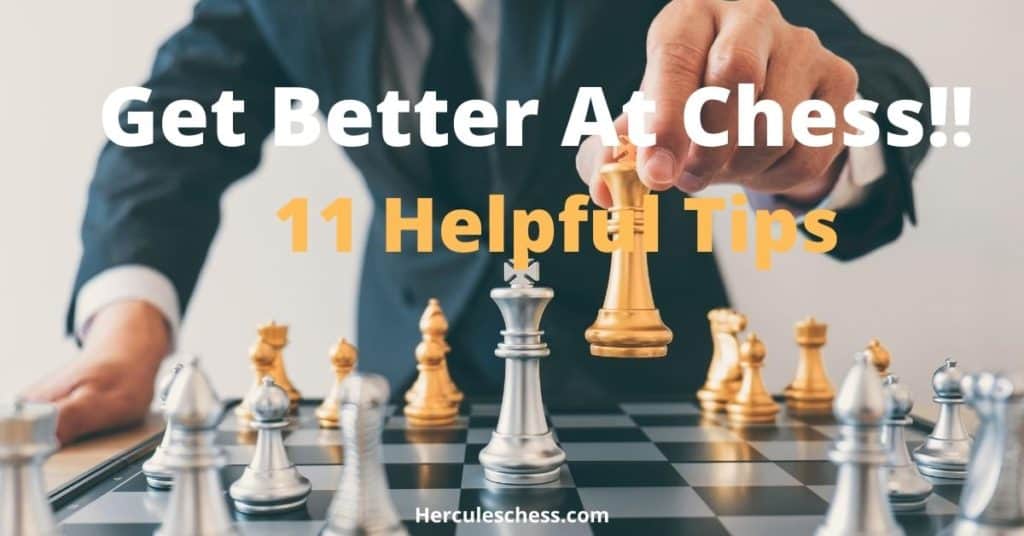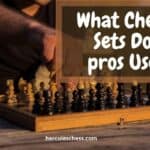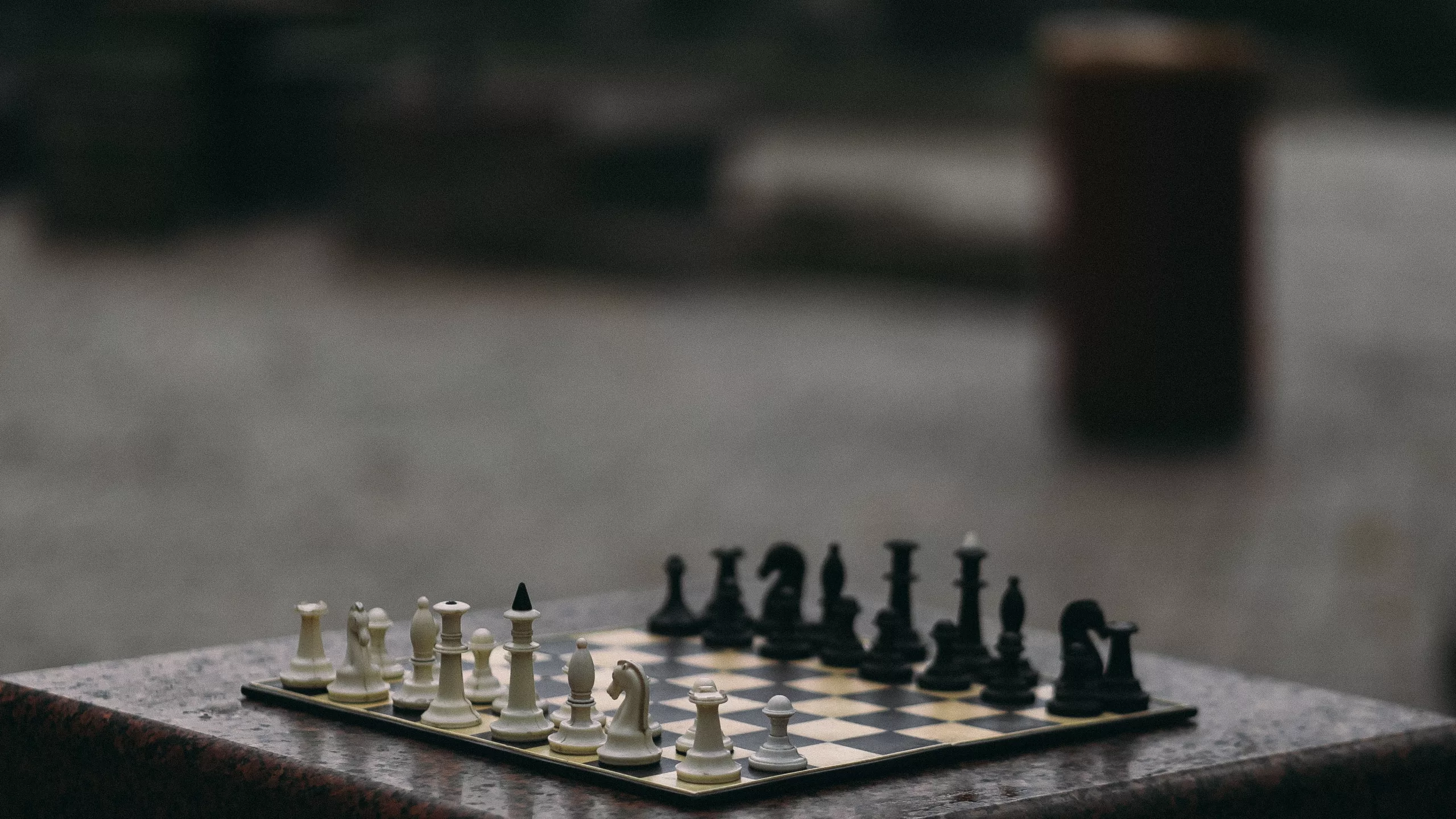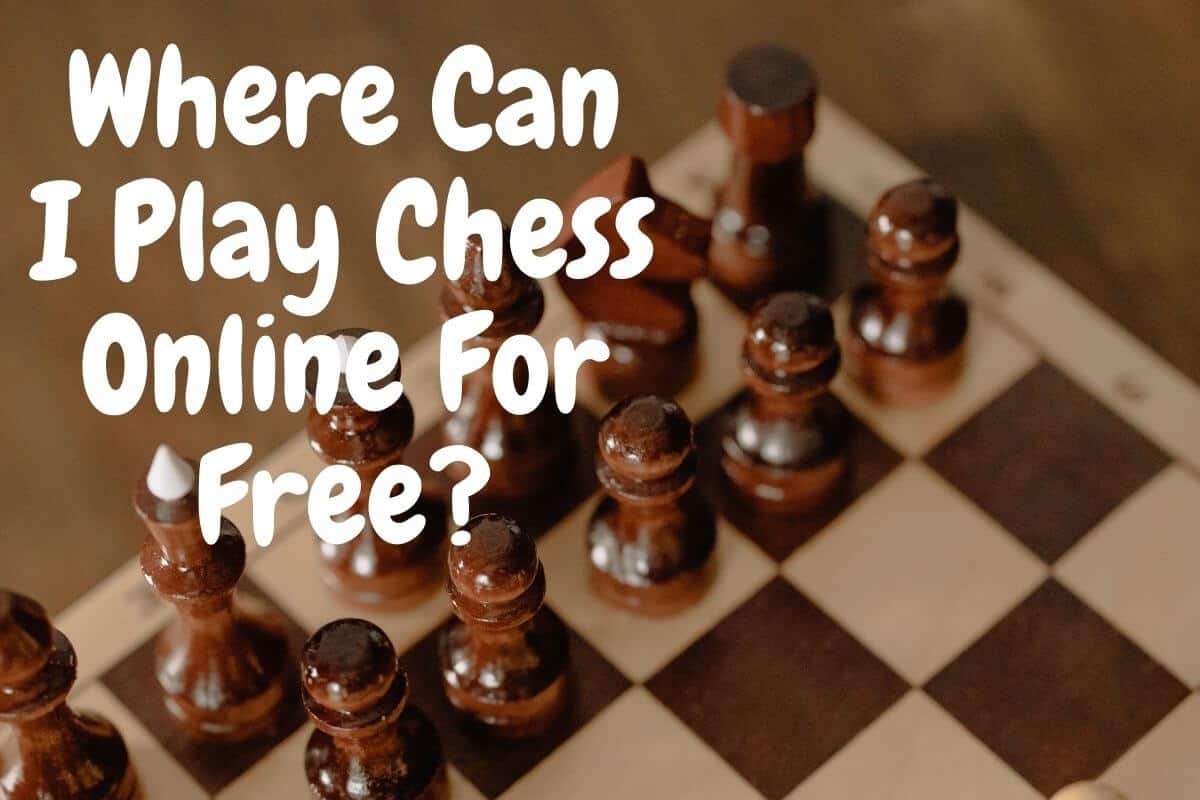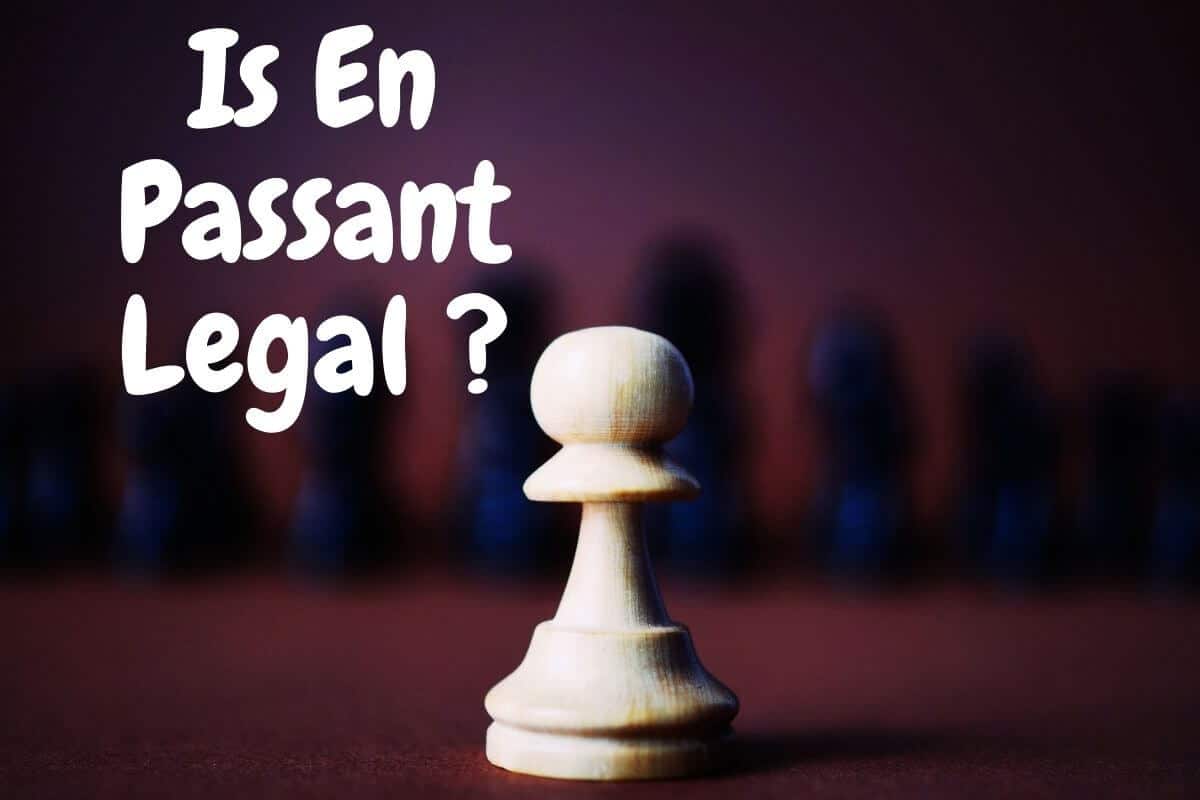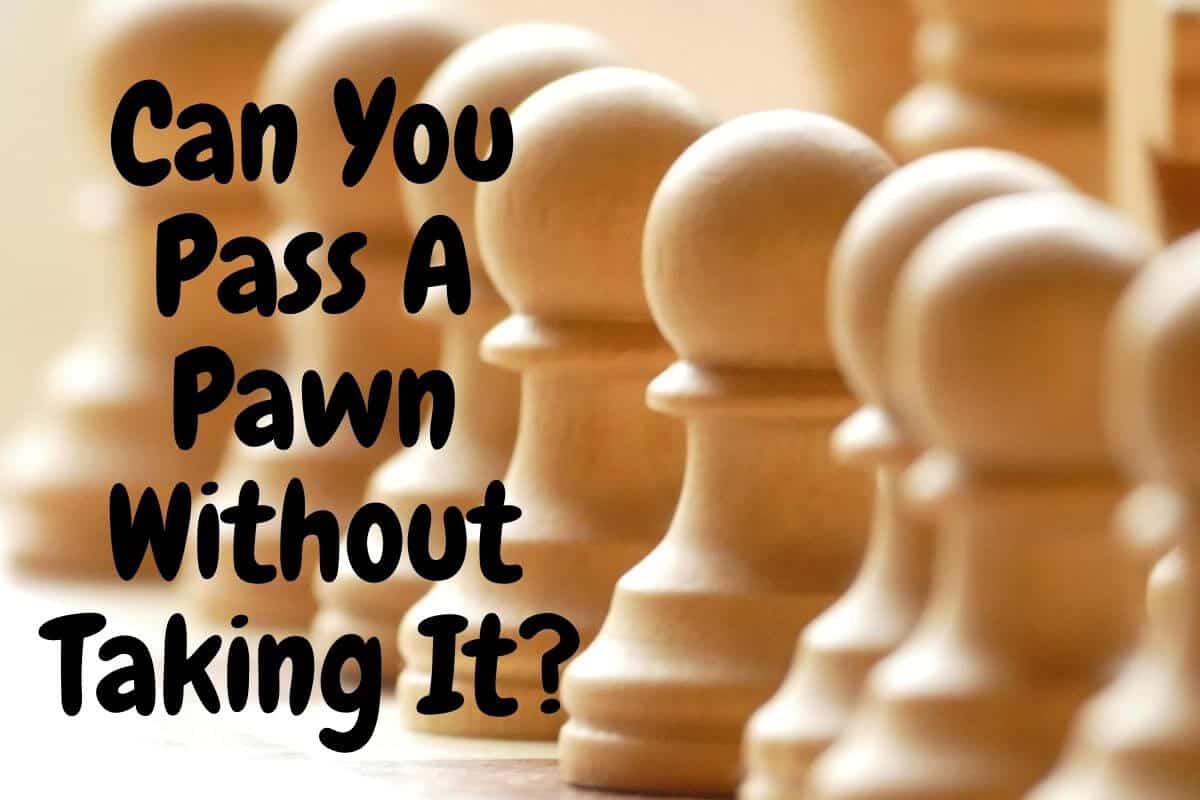If you want to know how to get better at chess, then you’ve came to the right article. For many years, the great American grandmaster Larry Evans wrote a very popular column in Chess Life magazine. I remember a time when I was reading his column (in which he answered some letters from readers) and saw a letter from a player of my acquaintance, a fellow I’d once met and played against at a chess tournament years before.
I don’t have the column handy to quote the letter, but the gist of his problem was this: the player had hit a “plateau” in his chess advancement and he felt like he’d kind of stalled. Even though he was playing and studying chess, he seemed to have stopped progressing as a player and he felt like his chess development was stuck in neutral.
Grandmaster Evans gave the guy some great advice, which I’ve expanded upon and modified in a number of articles I’ve written. Here I’ll offer you my latest version consisting of eleven tips, five from GM Evans and six from me, all of which I’ve followed and which have helped me to get better at chess. I’ll then further elaborate on each one so you can get a better understanding.
Here are the 11 most helpful tips to get better at chess:
- Study chess tactics
- Study the endgame
- Learn some basic chess openings and the plans of each.
- Develop your positional understanding of chess
- Play chess as often as you can (That does not mean blitz and bullet games)
- Annotate your chess moves
- Review your games later
- Reach out to stronger players and learn from them
- Make use of all the chess books and software you possess
- Play over the chess games of other players
- Don’t kick yourself over losing a game. Remember chess is about having fun 🙂
How To Get Better At Chess
1. Study Chess Tactics
For the average player, two areas of chess study will produce improved results faster than any other. One of these areas is chess tactics (short term move combinations which result in material gains or a win, such as pins, forks, skewers, checkmates, etc.).
Much of a player’s tactical prowess involves pattern recognition. In many tactical themes, the same kind of chess position comes up again and again. Learn to spot these tactical opportunities, not only when it’s your turn to move but also as far as your opponent’s pieces are concerned (if you spot an opportunity for your opponent before he does, you may be able to head him off at the pass and correct the problem before he has a chance to drop the bomb on you).
A great player from the “classical era” named Richard Teichmann once famously declared that “chess is 99% tactics”. While I’d argue that he might have overstated the case just a bit, tactical prowess is undeniably very important in chess. You don’t have to become a Mikhail Tal, but you do need to be able to pickup on the fact that a simple intermediate move on your part will set up a material-winning tactic.
If you are ready to sharpen your tactical, visual and calculation skills, then click here to learn more from Grandmaster and chess coach Igor Smirnov
2. Study The Endgame
One of the best ways to get better at chess is to study the endgame. Many, many (too many) players hate studying chess endgames, and that’s pretty unfortunate. The endgame is pretty interesting, full of surprises and exceptions which every player needs to know about.
11 Chess Endgame patterns you must know
And if I had a buck for every time I’ve seen a player blow a hard-won material advantage in the endgame and wind up losing a game he/ she should have won, I’d own a tropical paradise and be there now with a tall frosty one (and a cold drink, too), and you and I would not be having this discussion.
STUDY YOUR ENDGAMES!
There’s no excuse for losing a game you have easily won because you spent hours memorizing obscure opening variations instead of learning basic endgame principles! (And if there’s one thing I’ve learned from my own recent trainings, it’s that I, too, need to spend more time with the chess endings.)
Best Endgame course 2021 (Become a complete chess player by mastering the endgame with Grandmaster Igor Smirnov)
3. Learn some opening basics, but don’t spend hours memorizing variations
GM Evans asserted that no player rated lower than 2000 Elo (USCF) should worry about studying openings. I agree with him in general principle, but I disagree on the specifics. I think that every chess player (including beginners) should know the basic ideas behind the chess openings they regularly play, as well as one to three main variations.
But no untitled (below Expert level) chess player needs to spend countless hours memorizing dozens upon dozens of opening variations. Most of your opponents are going to play something weird around move 8 anyway, and all of that careful “opening preparation” just becomes wasted time.
And just because a chess opening encyclopedia says you have a “winning position” at the end of your “pet” variation doesn’t mean that you have an “insta-win”. The game doesn’t play itself, and you still have to prove you have a win by actually winning the danged game.
The only short “insta-wins” I’ve ever enjoyed were in correspondence games, and with three days to ponder a move plus chess library access allowed by the rules, those wins were gifts from poor opponents, not the result of my “brilliant” opening play from hours of preparation and memorization. Take that time you spend on memorizing openings and use it to study tactics and endgames instead. You’ll thank me (and GM Evans) later.
4. Study Positional Chess (e.g Chess Strategy)
Some wiseguy once said that tactics are what you do when there’s something to do, while strategy is what you do when there’s nothing to do. That’s wrong, but not by much.
A tactic is typically a series of moves which end in a demonstrable material gain. Strategy, on the other hand, involves long range planning, getting your pieces to good squares, making sure your pawn structure is sound, placing your chess men on squares where they act harmoniously to give you a strong position.
It’s also the process by which your moves cause your opponent to weaken his position a bit at a time, and to the mental process by which you can recognize those weaknesses. It sounds complicated, but studying chess strategy can really improve your game.
Until I learned some fundamentals of strategy and long-term planning, I was really just hacking around with chess, playing at the game instead of really playing it. After I learned a number of strategic themes (through the books of Ludek Pachman, as well as through some other good sources), my games became easier; it was more simple for me to not only play with a plan, but to play with a good plan.
Develop your positional understanding of chess with top chess coach and grandmaster Igor Smirnov. Click here to learn more<<
5. Play as much chess as you can
Quite simply, the more you play, the more you understand. You can read about rook endgames all day long, but it won’t mean a thing until you actually play some rook endgames.
Likewise, nothing teaches us what we don’t know the way playing chess games does; until you completely blow a Rook endgame, you might not realize that you need to study Rook endgames. Conversely, few things are as satisfying as learning a new chess concept and then successfully applying it in a game. To be good at chess, you have to play chess.
6. Write down or record the moves to every game you play
Obviously if you’re playing a blitz game face to face with someone (as opposed to over the Internet), you’re not going to be able to record the moves. But for games at a reasonably long time controls (I’ve written down moves for games with a ten minute limit), as well as for Internet games, you should record your moves.
If you’re playing online chess, there’s no reason not to record your moves (even in blitz or bullet games); most sites have a feature that keeps track of your moves and lets you download the game score (or will send it to you via e-mail) at the click of a button. If you own a chess program with database features, you should create a database of your own games (both online games and games played face to face); if you don’t have such a program, keep your games in a notebook or chess score book.
There are plenty of good reasons for keeping your games. If nothing else, they’re a record of your chess exploits; over time, you’ll be able to go back over old games you’ve played and see how you’ve improved. When you play a really good game, you’ll be able to replay it as often as you like if you recorded the moves.
If you play an awful game, you can go over it to try to learn where you made your mistakes. Keeping your games in an electronic database gives you the chance to analyze them with a chess engine later; it also makes it easy to add your own notes and variations to the game. That brings us directly to the next tip:
Related post: How to read and write down chess moves
7. Review your games later
Go back and replay as many of your games as you can, especially your losses. And you should do this as soon as possible after the game is played (not immediately, of course, but within a day or two). When I was an active tournament player, I would copy my games into a physical score book and input them to a computer database within a couple of days after the event.
I’d also add notes to my games, writing down what I’d been thinking or what my plan was at various points during the game. Today I can go back and review these games and, now that I know more about chess than I did at the time, I can see that some of my ideas were good, some were bad (and this connects directly with a point made under Tip #6: the ability to see how your chess has improved over time).
To analyze your games properly, take this FREE course
8. Get help and advice from stronger players
This is another reason why you should record your games: you can review them with a stronger player to get an opinion and some advice. Most chess clubs I’ve belonged to had a strong player or three who loved to help out club members who wanted their advice.
When you lose a tournament game to a stronger player, the post mortem (the after the game discussion) is often very instructive and enlightening. And you may not know this now, but the biggest advantage to owning a chess playing program is the ability to have a strong chess engine analyze your games, show where you made mistakes, and offer suggestions for better moves.
9. When you buy books, videos, software, and other training materials, use them!
Nobody ever improved at chess just by maxing out his credit card purchasing chess books, programs, videos, etc. Otherwise many of could buy our way to the grandmaster title. Don’t laugh, I’ve known many players (and had many customers) over the years who act like they must own every new chess video or software training disk that comes down the pike.
They wind up with shelves of it, and guess where the stuff mostly stays? On the shelf. If you spend good money on chess instructional materials, use them. Don’t leave them lying around unused, or you’ve just wasted your money. As I’ve said in previous articles when I’ve listed these tips, sleeping with a chess book or disk under your pillow will not cause the material to seep into your head through some kind of strange osmosis.
If you buy a book, read it. If you purchase a video, watch it. If you get a software training disk, use it. Learn the lessons they contain and, most of all, learn to apply those lessons in your own games.
10. Play over the chess games of other players
You can learn a lot about chess by replaying the games of stronger players, especially games which have annotations (comments and variations which explain the game), as long as you understand what’s going on.
I’m a huge fan of games played between the 1850’s and World War II, and it’s for a very practical reason. One of my favorite chess players and writers was a brainy mug named Richard Reti, who wrote one of the greatest chess books of all time, Masters of the Chessboard, in which he offers plenty of commented games by great players. When Reti was trying to come up with a way to organize his book, he came to a sudden epiphany, a real brainstorm: he realized that most players learn about chess concepts in roughly the same order as the way these concepts developed historically. In other words, beginners can easily understand old Paul Morphy and Adolf Anderssen games from the 1800’s, while a game played last night between two top players will baffle them.
That’s why I love older games. I get them, I understand what’s happening and, when I don’t understand something, I can usually figure it out. On the other hand, a lot of postwar chess just shoots right over my head. So don’t avoid older games because “they don’t have the latest opening theory”; that’s just crazy (and see Tip #3 anyway). You should absolutely study pre-war chess games, because you’ll find them a whole lot easier to understand.
As far as current games go, if your home state, province, region, etc. publishes a chess newsletter, you should subscribe to it, as these little magazines are often a treasure trove of commented games, often played between average club players, games which are easily understood and enormously instructive.
And, finally, the most important tip of all:
11. Don’t kick yourself over losing a game
Winning is more fun than losing, I’ll admit that. But I view a chess loss as an opportunity for improvement. When I figure out why I lost a game, I learn what I need to work on to become a better player. I don’t kick myself, I don’t get depressed, instead, I get to work.
Besides, everybody loses; we’ve already seen how Garry Kasparov, considered by many to be the strongest chess player of all time, lost to a machine. Losing is disappointing, but it’s up to you to turn that disadvantage into an advantage. Treat your chess losses as opportunities, chances to become a better player, and you’re likely to find that you’ve become something of a better person as well.
In my opinion, that’s the real value of chess (as well as just about any other competitive endeavor, come to think of it). Although this has become something of a passé notion in the twenty-first century, I’m a firm believer in the idea that competition builds character.
Since chess is a one-on-one contest, it provides a unique opportunity for each of us to learn about ourselves, how we react to adversity, how we behave when we win. Chess gives us a means to test ourselves, to better ourselves. But we can’t do that when we kick ourselves, get depressed, or throw a tantrum over a loss. Don’t despair over a loss, learn from it, and you’ll likely learn something about yourself in the process, too 🙂
